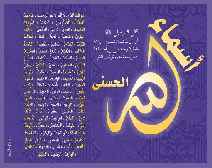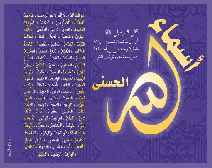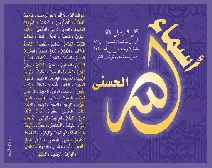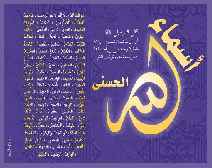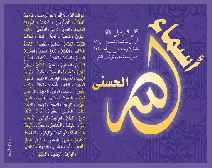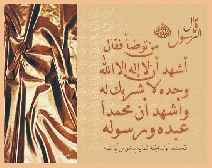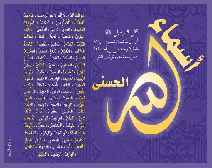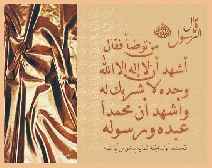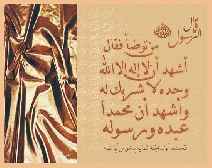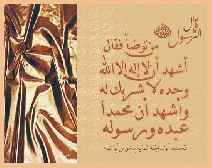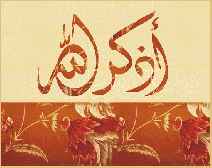Display Videos ( 1551 - 1575 of: 2027 )
2011-06-20
Abu Muhammad ’Abdullah bin Amr bin al-’As, radiyallahu ’anhu, reported that the Messenger of Allah, sallallahu ’alayhi wasallam, said:
”None of you (truly) believes until his desire or inclination is in accordance with what I have brought or subservient to what I came with.” [A fine and genuine hadith which was related by al-Maqdidsi in his Book of Hujjah]
”None of you (truly) believes until his desire or inclination is in accordance with what I have brought or subservient to what I came with.” [A fine and genuine hadith which was related by al-Maqdidsi in his Book of Hujjah]
2011-06-20
On the authority of Ibn ’Umar, radiyallahu ’anhuma, who said: The Messenger of Allah, sallallahu ’alayhi wasallam, took me by the shoulder and said:
"Be in this world as though you were a stranger or a traveler/wayfarer."
Ibn ’Umar used to say:
"When evening comes, do not expect (to live till) morning, and when morning comes, do not expect (to live till) evening. Take from your health (a preparation) for your illness, and from your life for your death." [Al-Bukhari]
"Be in this world as though you were a stranger or a traveler/wayfarer."
Ibn ’Umar used to say:
"When evening comes, do not expect (to live till) morning, and when morning comes, do not expect (to live till) evening. Take from your health (a preparation) for your illness, and from your life for your death." [Al-Bukhari]
2011-06-20
Ibn Abbas, radiyallahu ’anhu, reported that the Messenger of Allah, sallallahu ’alayhi wasallam, said:
”Truly Allah has for my sake pardoned the mistakes and forgetfulness of my community, and for what they have done under force or duress.” [A fine hadith related by Ibn Majah, Al-Baihaqi and others]
”Truly Allah has for my sake pardoned the mistakes and forgetfulness of my community, and for what they have done under force or duress.” [A fine hadith related by Ibn Majah, Al-Baihaqi and others]
2011-06-20
Abu Hurairah, radiyallahu ’anhu, reported that the Messenger of Allah, sallallahu ’alayhi wasallam, said:
”Allah the Almighty has said: ’Whosoever acts with enmity towards a closer servant of Mine (wali), I will indeed declare war against him. Nothing endears My servant to Me than doing of what I have made obligatory upon him to do. And My servant continues to draw nearer to Me with supererogatory (nawafil) prayers so that I shall love him. When I love him, I shall be his hearing with which he shall hear, his sight with which he shall see, his hands with which he shall hold, and his feet with which he shall walk. And if he asks (something) of Me, I shall surely give it to him, and if he takes refuge in Me, I shall certainly grant him it.’” [Al-Bukhari]
”Allah the Almighty has said: ’Whosoever acts with enmity towards a closer servant of Mine (wali), I will indeed declare war against him. Nothing endears My servant to Me than doing of what I have made obligatory upon him to do. And My servant continues to draw nearer to Me with supererogatory (nawafil) prayers so that I shall love him. When I love him, I shall be his hearing with which he shall hear, his sight with which he shall see, his hands with which he shall hold, and his feet with which he shall walk. And if he asks (something) of Me, I shall surely give it to him, and if he takes refuge in Me, I shall certainly grant him it.’” [Al-Bukhari]
2011-06-20
Ibn Abbas, radiyallahu ’anhu, reported that the Messenger of Allah, sallallahu ’alayhi wasallam, related from his Lord (glorified and exalted be He):
”Verily Allah has recorded the good deeds and the evil deeds.” Then he clarified that: ”Whosoever intends to do a good deed but does not do it, Allah records it with Himself as a complete good deed; but if he intends it and does it, Allah records it with Himself as ten good deeds, up to seven hundred times, or more than that. But if he intends to do an evil deed and does not do it, Allah records it with Himself as a complete good deed; but if he intends it and does it, Allah records it down as one single evil deed.” [Al-Bukhari & Muslim]
Each in his Sahih have thus related it in these words:
”So look! My brother, may Allah help us, and take note of how great is the kindness of Allah - may He be exalted! Reflect on this, how that His saying ”with Himself” points to His great care with regard to it, and His saying ”complete” is for emphasis, not to point to the intensity of His care with regard to it. With regard to the evil deed which one intended but then abandoned, He says: ”Allah records it with Himself as a complete good deed”, emphasising this by the word ”complete” (kamilah); whereas if he performs it, He records it down as ”one evil deed”, where by the word ”one” He emphasises its being made little of, since He does not emphasise it here by the word ”complete”. So to Allah be praise and grace. Glory be to Him! Our praises to Him we cannot count. With Allah is success.”
”Verily Allah has recorded the good deeds and the evil deeds.” Then he clarified that: ”Whosoever intends to do a good deed but does not do it, Allah records it with Himself as a complete good deed; but if he intends it and does it, Allah records it with Himself as ten good deeds, up to seven hundred times, or more than that. But if he intends to do an evil deed and does not do it, Allah records it with Himself as a complete good deed; but if he intends it and does it, Allah records it down as one single evil deed.” [Al-Bukhari & Muslim]
Each in his Sahih have thus related it in these words:
”So look! My brother, may Allah help us, and take note of how great is the kindness of Allah - may He be exalted! Reflect on this, how that His saying ”with Himself” points to His great care with regard to it, and His saying ”complete” is for emphasis, not to point to the intensity of His care with regard to it. With regard to the evil deed which one intended but then abandoned, He says: ”Allah records it with Himself as a complete good deed”, emphasising this by the word ”complete” (kamilah); whereas if he performs it, He records it down as ”one evil deed”, where by the word ”one” He emphasises its being made little of, since He does not emphasise it here by the word ”complete”. So to Allah be praise and grace. Glory be to Him! Our praises to Him we cannot count. With Allah is success.”
2011-06-20
It was related on the authority of Abu Hurairah, radiyallahu ’anhu, that the Prophet, sallallahu ’alayhi wasallam, said:
”Whosoever relieves from a believer some grief pertaining to this world, Allah will relieve from him some grief pertaining to the Hereafter. Whosoever alleviates the difficulties of a needy person who cannot pay his debt, Allah will alleviate his difficulties in both this world and the Hereafter. Whosoever conceals the faults of a Muslim, Allah will conceal his faults in this world and the Hereafter. Allah will aid a servant (of His) so long as the servant aids his brother. Whosoever follows a path to seek knowledge therein, Allah will make easy for him a path to Paradise. No people gather together in one of the houses of Allah, reciting the Book of Allah and studying it among themselves, except that tranquility descends upon them, mercy covers them, the angels surround them, and Allah makes mention of them amongst those who are in His presence. Whosoever is slowed down by his deeds will not be hastened forward by his lineage.” [Muslim]
”Whosoever relieves from a believer some grief pertaining to this world, Allah will relieve from him some grief pertaining to the Hereafter. Whosoever alleviates the difficulties of a needy person who cannot pay his debt, Allah will alleviate his difficulties in both this world and the Hereafter. Whosoever conceals the faults of a Muslim, Allah will conceal his faults in this world and the Hereafter. Allah will aid a servant (of His) so long as the servant aids his brother. Whosoever follows a path to seek knowledge therein, Allah will make easy for him a path to Paradise. No people gather together in one of the houses of Allah, reciting the Book of Allah and studying it among themselves, except that tranquility descends upon them, mercy covers them, the angels surround them, and Allah makes mention of them amongst those who are in His presence. Whosoever is slowed down by his deeds will not be hastened forward by his lineage.” [Muslim]
2011-06-20
Abu Hurairah, radiyallahu ’anhu, reported that the Messenger of Allah, sallallahu ’alayhi wasallam, said:
”Do not be envious of one another; do not artificially inflate prices against one another; do not hate one another; do not shun one another; and do not undercut one another in business transactions; and be as fellow-brothers and servants of Allah.
A Muslim is the brother of a Muslim. He neither oppresses him nor humiliates him nor looks down upon him. Piety is here - and he pointed to his chest three times. It is evil enough for a Muslim to hold his brother Muslim in contempt. All things of a Muslim are inviolable for another Muslim: his blood, his property and his honour.” [Muslim]
”Do not be envious of one another; do not artificially inflate prices against one another; do not hate one another; do not shun one another; and do not undercut one another in business transactions; and be as fellow-brothers and servants of Allah.
A Muslim is the brother of a Muslim. He neither oppresses him nor humiliates him nor looks down upon him. Piety is here - and he pointed to his chest three times. It is evil enough for a Muslim to hold his brother Muslim in contempt. All things of a Muslim are inviolable for another Muslim: his blood, his property and his honour.” [Muslim]
2011-06-20
On the authority of Abu Sa’id al-Khudri, radiyallahu ’anhu, who said: I heard the Messenger of Allah, sallallahu ’alayhi wasallam, say:
”When any one of you sees anything that is disapproved (of by Allah), let him change it with his hand. If he is not able to do so, then let him change it with his tongue. And if he is not able to do so, then let him change it with his heart, though that is the weakest (kind of) faith.” [Muslim]
”When any one of you sees anything that is disapproved (of by Allah), let him change it with his hand. If he is not able to do so, then let him change it with his tongue. And if he is not able to do so, then let him change it with his heart, though that is the weakest (kind of) faith.” [Muslim]
2011-06-20
Ibn ’Abbas, radiyallahu ’anhu, said that the Messenger of Allah, sallallahu ’alayhi wasallam, said:
”Were people to be given according to their claims, some would claim the wealth and blood of others. But the burden of proof is upon the claimant and the taking of an oath is upon the one who denies (the allegation).” [An excellent hadith which al-Bayhaqi and others have related. Parts of it is in the two Sahih books (i.e. in al-Bukhari and Muslim).]
”Were people to be given according to their claims, some would claim the wealth and blood of others. But the burden of proof is upon the claimant and the taking of an oath is upon the one who denies (the allegation).” [An excellent hadith which al-Bayhaqi and others have related. Parts of it is in the two Sahih books (i.e. in al-Bukhari and Muslim).]
2011-06-20
It was related on the authority of Abu Sa’id Sa’d bin Malik bin Sinan al-Khudri, radiyallahu ’anhu, that the Messenger of Allah, sallallahu ’alayhi wasallam, said:
”There should be neither harming nor reciprocating harm.”
[A excellent hadith which Ibn Majah, Al-Daraqutni and others related as of sound isnad, but which Malik related in his Muwatta’ as of broken isnad, from ’Amr bin Yahya, from his father, from the Prophet, sallallahu ’alayhi wasallam, but dropping (the name of) Abu Sa’id. This hadith has lines of transmission which strengthen one another (so that it may be regarded as of sound isnad).]
”There should be neither harming nor reciprocating harm.”
[A excellent hadith which Ibn Majah, Al-Daraqutni and others related as of sound isnad, but which Malik related in his Muwatta’ as of broken isnad, from ’Amr bin Yahya, from his father, from the Prophet, sallallahu ’alayhi wasallam, but dropping (the name of) Abu Sa’id. This hadith has lines of transmission which strengthen one another (so that it may be regarded as of sound isnad).]
2011-06-20
On the authority of Abu al-’Abbas Sahl bin Sa’d al-Sa’idi, radiyallahu ’anhu, who said:
A man came to the Prophet, sallallahu ’alayhi wasallam, and said: ”O Messenger of Allah, direct me to an act which if I do it, [will cause] Allah to love me and people to love me.” He, sallallahu ’alayhi wasallam, answered: ”Be indifferent to the world and Allah will love you; be indifferent to what people possess and they will love you.” [A fine hadith related by Ibn Majah and others with good chains of authorities]
A man came to the Prophet, sallallahu ’alayhi wasallam, and said: ”O Messenger of Allah, direct me to an act which if I do it, [will cause] Allah to love me and people to love me.” He, sallallahu ’alayhi wasallam, answered: ”Be indifferent to the world and Allah will love you; be indifferent to what people possess and they will love you.” [A fine hadith related by Ibn Majah and others with good chains of authorities]
2011-06-20
It was narrated on the authority of Abi Tha’labah Al-Khushani Jurthum bin Nashir, radiyallahu ’anhu, that the Messenger of Allah, sallallahu ’alayhi wasallam, said:
”Verily Allah the Almighty has prescribed the obligatory deeds, so do not neglect them; He has set certain limits, so do not go beyond them; He has forbidden certain things, so do not indulge in them; and He has said nothing about certain things, as an act of mercy to you, not out of forgetfulness, so do not go enquiring into these.” [Related by Al-Daraqutni and others - Al-Nawawi said this is a hasan (fine) hadith]
”Verily Allah the Almighty has prescribed the obligatory deeds, so do not neglect them; He has set certain limits, so do not go beyond them; He has forbidden certain things, so do not indulge in them; and He has said nothing about certain things, as an act of mercy to you, not out of forgetfulness, so do not go enquiring into these.” [Related by Al-Daraqutni and others - Al-Nawawi said this is a hasan (fine) hadith]
2011-06-20
From Mu’adh bin Jabal, radiyallahu ’anhu, who said: I said:
”O Messenger of Allah, tell me of a deed which will take me into Paradise and will keep me away from the Hell-fire.” He said: ”You have asked me about a great matter, yet it is, indeed, an easy matter for him to whom Allah Almighty makes it easy. (It is ) that you worship Allah without associating anything with Him, that you perform the prayers, that you pay the zakat, that you fast during Ramadan, and that you make the pilgrimage to the House.”
Then he said: ”Shall I not guide you to the gates of goodness? Fasting is a shield; charity extinguishes sin as water extinguishes fire; and a man’s prayer in the middle of the night.” Then he recited: ”Who forsake their beds to cry unto their Lord in fear and hope, and spend of that We have bestowed on them. No soul knoweth what is kept hid for them of joy, as a reward for what they used to do”. [Qu’ran, Surah al-Sajdah (32): Ayah 16-17]
Then he said: ”Shall I not also tell you of the peak of the matter, its pillar, and its topmost part?” I said: ”Yes, O Messenger of Allah.” He said: ”The peak of the matter is Islam (submission to Allah), the pillar is prayer; and its topmost part is jihad.” Then he said: ”And shall I not tell you of the controlling of all that ?” I said:” Yes, O Messenger of Allah”. So he took hold of his tongue and said: ”Restrain this.” I said: ”O Prophet of Allah, will we be held accountable for what we say?” He said: ”May your mother be bereft of you! Is there anything that topples people on their faces (or he said, on their noses) into the Hell-fire other than the jests of their tongues?” [Related by Al-Tirmidhi, who said it was a fine and sound hadith]
”O Messenger of Allah, tell me of a deed which will take me into Paradise and will keep me away from the Hell-fire.” He said: ”You have asked me about a great matter, yet it is, indeed, an easy matter for him to whom Allah Almighty makes it easy. (It is ) that you worship Allah without associating anything with Him, that you perform the prayers, that you pay the zakat, that you fast during Ramadan, and that you make the pilgrimage to the House.”
Then he said: ”Shall I not guide you to the gates of goodness? Fasting is a shield; charity extinguishes sin as water extinguishes fire; and a man’s prayer in the middle of the night.” Then he recited: ”Who forsake their beds to cry unto their Lord in fear and hope, and spend of that We have bestowed on them. No soul knoweth what is kept hid for them of joy, as a reward for what they used to do”. [Qu’ran, Surah al-Sajdah (32): Ayah 16-17]
Then he said: ”Shall I not also tell you of the peak of the matter, its pillar, and its topmost part?” I said: ”Yes, O Messenger of Allah.” He said: ”The peak of the matter is Islam (submission to Allah), the pillar is prayer; and its topmost part is jihad.” Then he said: ”And shall I not tell you of the controlling of all that ?” I said:” Yes, O Messenger of Allah”. So he took hold of his tongue and said: ”Restrain this.” I said: ”O Prophet of Allah, will we be held accountable for what we say?” He said: ”May your mother be bereft of you! Is there anything that topples people on their faces (or he said, on their noses) into the Hell-fire other than the jests of their tongues?” [Related by Al-Tirmidhi, who said it was a fine and sound hadith]
2011-06-20
It was narrated on the authority of Abu Najih al-Irbad bin Sariyah, radiyallahu ’anhu, who said:
The Messenger of Allah, sallallahu ’alayhi wasallam, delivered an admonition that made our hearts fearful and our eyes tearful. We said, ”O Messenger of Allah, it is as if this were a farewell sermon, so advise us.” He said, ”I enjoin you to have Taqwa of Allah and that you listen and obey, even if a slave is made a ruler over you. He among you who lives long enough will see many differences. So for you is to observe my Sunnah and the Sunnah of the rightly-principled and rightly-guided successors, holding on to them with your molar teeth. Beware of newly-introduced matters, for every innovation (bid’ah) is an error.” [Abu Dawud & Al-Tirmidhi, who says it is an authentic hadith]
The Messenger of Allah, sallallahu ’alayhi wasallam, delivered an admonition that made our hearts fearful and our eyes tearful. We said, ”O Messenger of Allah, it is as if this were a farewell sermon, so advise us.” He said, ”I enjoin you to have Taqwa of Allah and that you listen and obey, even if a slave is made a ruler over you. He among you who lives long enough will see many differences. So for you is to observe my Sunnah and the Sunnah of the rightly-principled and rightly-guided successors, holding on to them with your molar teeth. Beware of newly-introduced matters, for every innovation (bid’ah) is an error.” [Abu Dawud & Al-Tirmidhi, who says it is an authentic hadith]
2011-06-20
Al-Nawwas bin Sam’an, radiyallahu ’anhu, reported that the Prophet, sallallahu ’alayhi wasallam, said:
”Righteousness is good character, and sin is that which wavers in your heart and which you do not want people to know about.” [Muslim]
According to Wabisah bin Ma’bad, radiyallahu ’anhu, who said:
I came to the Messenger of Allah, sallallahu ’alayhi wasallam, and he said: ”You have come to ask about righteousness ?” ” Yes,” I answered. He said: ”Consult your heart. Righteousness is that about which the soul feels tranquil and the heart feels tranquil, and sin is what creates restlessness in the soul and moves to and fro in the breast, even though people give you their opinion (in your favour) and continue to do so.”
”Righteousness is good character, and sin is that which wavers in your heart and which you do not want people to know about.” [Muslim]
According to Wabisah bin Ma’bad, radiyallahu ’anhu, who said:
I came to the Messenger of Allah, sallallahu ’alayhi wasallam, and he said: ”You have come to ask about righteousness ?” ” Yes,” I answered. He said: ”Consult your heart. Righteousness is that about which the soul feels tranquil and the heart feels tranquil, and sin is what creates restlessness in the soul and moves to and fro in the breast, even though people give you their opinion (in your favour) and continue to do so.”
2011-06-20
Abu Hurairah, radiyallahu ’anhu, reported that the Messenger of Allah, sallallahu ’alayhi wasallam, said :
”On every person’s joints or small bones (i.e. fingers and toes), there is sadaqah (charity) every day the sun rises. Doing justice between two people is sadaqah; assisting a man to mount his animal, or lifting up his belongings onto it is sadaqah; a good word is sadaqah; every step you take towards prayer is sadaqah; and removing harmful things from pathways is sadaqah.” [Al-Bukhari & Muslim]
”On every person’s joints or small bones (i.e. fingers and toes), there is sadaqah (charity) every day the sun rises. Doing justice between two people is sadaqah; assisting a man to mount his animal, or lifting up his belongings onto it is sadaqah; a good word is sadaqah; every step you take towards prayer is sadaqah; and removing harmful things from pathways is sadaqah.” [Al-Bukhari & Muslim]
2011-06-20
Abu Dharr, radiyallahu ’anhu, reported that some of the Companions of the Messenger of Allah, sallallahu alayhi wasallam, said to him:
”O Messenger of Allah, the rich have taken away all the rewards. They observe the prayer as we do, and they keep the fasts as we do, and they give sadaqah (charity) from their surplus riches.” Upon this he (the Prophet) said: ”Has Allah not prescribed for you (a course) by following which you can also do sadaqah? Verily in every tasbih (i.e. saying Subhanallah) there is a sadaqah, every takbir (i.e. saying Allahu Akbar) is a sadaqah, every tahmid (i.e. saying Alhamdulillah) is a sadaqah, every tahlil (i.e. saying Lailaha illallah) is a sadaqah, enjoining of good is a sadaqah, forbidding of evil is a sadaqah, and having sexual intercourse with your wife is a sadaqah. They (the Companions) said: ”O Messenger of Allah, is there reward for him who satisfies his sexual passion among us?” He said: ”Tell me, if he were to devote it to something forbidden, would it not be a sin on his part? Similarly, if he were to devote it to something lawful, he should have a reward.” [Muslim]
”O Messenger of Allah, the rich have taken away all the rewards. They observe the prayer as we do, and they keep the fasts as we do, and they give sadaqah (charity) from their surplus riches.” Upon this he (the Prophet) said: ”Has Allah not prescribed for you (a course) by following which you can also do sadaqah? Verily in every tasbih (i.e. saying Subhanallah) there is a sadaqah, every takbir (i.e. saying Allahu Akbar) is a sadaqah, every tahmid (i.e. saying Alhamdulillah) is a sadaqah, every tahlil (i.e. saying Lailaha illallah) is a sadaqah, enjoining of good is a sadaqah, forbidding of evil is a sadaqah, and having sexual intercourse with your wife is a sadaqah. They (the Companions) said: ”O Messenger of Allah, is there reward for him who satisfies his sexual passion among us?” He said: ”Tell me, if he were to devote it to something forbidden, would it not be a sin on his part? Similarly, if he were to devote it to something lawful, he should have a reward.” [Muslim]
2011-06-20
It was relayed on the authority of Abu Dhar al-Ghifari, radiyallahu ’anhu, that the Prophet, sallallahu alayhi wasallam, said, of waht he related from his Lord, magnified and exhalted be He, Who said:
”O My servants, I have made oppression unlawful for Me and unlawful for you, so do not commit oppression against one another. O My servants, all of you are liable to err except for those whom I guide on the right path, therefore seek guidance from Me so that I should direct you to the right path. O My servants, all of you are hungry (needy) except for those whom I feed, therefore seek food from Me so that I may feed you. O My servants, all of you are naked (need clothes) except for those whom I provide garments, therefore seek clothing from Me so that I should clothe you. O My servants, you sin by night and by day and I am there to pardon your sins, therefore seek forgiveness from Me so that I should grant you pardon. O My servants, you can neither do Me any harm nor can you do Me any good. O My servants, even if the first amongst you and the last amongst you and the whole human race of yours and that of Jinns become as pious as the most pious heart of any one amongst you, it will not add anything to My Power or Kingdom. O My servants, even if the first amongst you and the last amongst you and the whole human race of yours and that of Jinns become as wicked as the most wicked heart of anyone amongst you, it will not decrease anything from My Power or Kingdom. O My servants, even if the first amongst you and the last amongst you and the whole human race of yours and that of Jinns gather together on a sector of land and all ask of Me and if I were to give everyone of them what they asked, that will not in any way decrease what I have anymore than a needle decreases what is in the ocean when it is put into it. O My servants, these deeds of yours which I am recording for you I shall reward you for them, so he who finds good should praise Allah and he who finds other than that should not blame anyone but himself.” [Muslim]
”O My servants, I have made oppression unlawful for Me and unlawful for you, so do not commit oppression against one another. O My servants, all of you are liable to err except for those whom I guide on the right path, therefore seek guidance from Me so that I should direct you to the right path. O My servants, all of you are hungry (needy) except for those whom I feed, therefore seek food from Me so that I may feed you. O My servants, all of you are naked (need clothes) except for those whom I provide garments, therefore seek clothing from Me so that I should clothe you. O My servants, you sin by night and by day and I am there to pardon your sins, therefore seek forgiveness from Me so that I should grant you pardon. O My servants, you can neither do Me any harm nor can you do Me any good. O My servants, even if the first amongst you and the last amongst you and the whole human race of yours and that of Jinns become as pious as the most pious heart of any one amongst you, it will not add anything to My Power or Kingdom. O My servants, even if the first amongst you and the last amongst you and the whole human race of yours and that of Jinns become as wicked as the most wicked heart of anyone amongst you, it will not decrease anything from My Power or Kingdom. O My servants, even if the first amongst you and the last amongst you and the whole human race of yours and that of Jinns gather together on a sector of land and all ask of Me and if I were to give everyone of them what they asked, that will not in any way decrease what I have anymore than a needle decreases what is in the ocean when it is put into it. O My servants, these deeds of yours which I am recording for you I shall reward you for them, so he who finds good should praise Allah and he who finds other than that should not blame anyone but himself.” [Muslim]
2011-06-20
On the authority of Abu Malik al-Harith bin ’Asim al-Ash’ari, radiyallahu ’anhu, who said: The Messenger of Allah, sallallahu ’alayhi wasallam, said:
”Purification is half of iman (faith). Saying ’Al-Hamdulillah’ (Praise be to Allah) fills the scales. Saying ’Subhanallah wa al-Hamdulillahi’ (Exhalted be Allah and Praise be to Allah) fills the space between the heavens and the earth. Salah (prayer) is a light. Sadaqah (charity) is a proof. Sabr (patience) is a shining glory. The Qur’an is an argument either for you or against you. Everybody goes out in the morning and sell themselves, thereby setting themselves free or destroying themselves.” [Muslim]
”Purification is half of iman (faith). Saying ’Al-Hamdulillah’ (Praise be to Allah) fills the scales. Saying ’Subhanallah wa al-Hamdulillahi’ (Exhalted be Allah and Praise be to Allah) fills the space between the heavens and the earth. Salah (prayer) is a light. Sadaqah (charity) is a proof. Sabr (patience) is a shining glory. The Qur’an is an argument either for you or against you. Everybody goes out in the morning and sell themselves, thereby setting themselves free or destroying themselves.” [Muslim]
2011-06-20
Abu ‘Abdullah Jabir bin ‘Abdullah al-Ansari, radiyallahu anhuma, reported that a man questioned the Messenger of Allah, sallallahu ‘alayhi wasallam, saying:
”Do you see, if I pray the prescribed (prayers), fast during Ramadhan, treat the lawful as permissible and treat the forbidden as prohibited, but do nothing more than that, shall I enter Paradise?” He (the Prophet, sallallahu ‘alayhi wasallam) answered: “Yes.” [Muslim]
”Do you see, if I pray the prescribed (prayers), fast during Ramadhan, treat the lawful as permissible and treat the forbidden as prohibited, but do nothing more than that, shall I enter Paradise?” He (the Prophet, sallallahu ‘alayhi wasallam) answered: “Yes.” [Muslim]
2011-06-20
On the authority of Abu ’Amr, though others call him Abu ’Amrah Sufyan bin ’Abdullah, radiyallahu anhu, who said:
I said: ”O Messenger of Allah, tell me something about Islam which I could not ask anyone about save you.” He answered: ”Say: ’I believe in Allah’, and then stand firm and steadfast.” [Muslim]
I said: ”O Messenger of Allah, tell me something about Islam which I could not ask anyone about save you.” He answered: ”Say: ’I believe in Allah’, and then stand firm and steadfast.” [Muslim]
2011-06-20
Abu Mas’ud ’Uqbah bin ’Amr al-Ansari al-Badri, radiyallahu ’anhu, reported that the Messenger of Allah, sallallahu ’alayhi wasallam, said:
”Among the things that people have found from the words of the previous prophets was: ’If you feel no shame, then do as you wish.’” [Al-Bukhari]
”Among the things that people have found from the words of the previous prophets was: ’If you feel no shame, then do as you wish.’” [Al-Bukhari]
2011-06-20
Abu al-‘Abbas ‘Abdullah bin ‘Abbas, radiyallahu anhuma, reported: One day I was behind the Prophet, sallallahu ‘alayhi wasallam, and he said to me:
”O young man, I shall teach you some words [of advice] : Be mindful of Allah, and Allah will protect you. Be mindful of Allah, and you will find Him in front of you. If you (have need to) ask, ask of Allah; and if you seek help, seek help from Allah. Know that even if the Nation (or the whole community) were to gather together to benefit you with something, they would not benefit you with anything except that which Allah has already recorded for you, and that if they gather together to harm you with something, they would not be able to harm you with anything except that which Allah has already recorded against you. The pens have been lifted and the pages have dried.” [Al-Tirmidhi relates this and says: It is a good, genuine Hadith]
”O young man, I shall teach you some words [of advice] : Be mindful of Allah, and Allah will protect you. Be mindful of Allah, and you will find Him in front of you. If you (have need to) ask, ask of Allah; and if you seek help, seek help from Allah. Know that even if the Nation (or the whole community) were to gather together to benefit you with something, they would not benefit you with anything except that which Allah has already recorded for you, and that if they gather together to harm you with something, they would not be able to harm you with anything except that which Allah has already recorded against you. The pens have been lifted and the pages have dried.” [Al-Tirmidhi relates this and says: It is a good, genuine Hadith]
2011-06-20
Abu Dhar Jundub bin Junadah and Abu Abdul Rahman Mu’adh bin Jabal, radiyallahu anhuma, reported that the Messenger of Allah, sallallahu ’alayhi wasallam, said:
“Fear Allah wherever you may be; follow up an evil deed with a good one which will wipe (the former) out, and behave good-naturedly towards people.” [Al-Tirmidhi relates it, saying: It is a good (hasan) Tradition. In some copies he says: It is a good and genuine (hasan and sahih) Hadith.]
“Fear Allah wherever you may be; follow up an evil deed with a good one which will wipe (the former) out, and behave good-naturedly towards people.” [Al-Tirmidhi relates it, saying: It is a good (hasan) Tradition. In some copies he says: It is a good and genuine (hasan and sahih) Hadith.]
2011-06-20
Abu Ya’la Shaddad ibn Aus, radiyallahu ’anhu, reported that the Messenger of Allah, sallallahu ’alayhi wasallam, said:
”Verily, Allah has enjoined excellence (ihsan) with regard to everything. So, when you kill, kill in a good way; when you slaughter, slaughter in a good way; so everyone of you should sharpen his knife, and let the slaughtered animal die comfortably.” [Muslim]
”Verily, Allah has enjoined excellence (ihsan) with regard to everything. So, when you kill, kill in a good way; when you slaughter, slaughter in a good way; so everyone of you should sharpen his knife, and let the slaughtered animal die comfortably.” [Muslim]


 New!
New!


